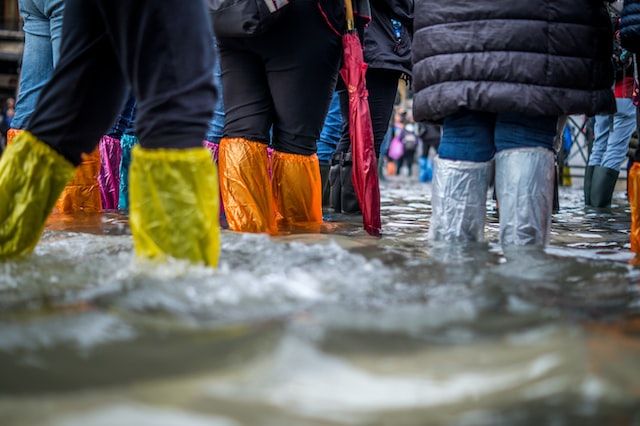
Summer Storm Safety
Summer has its sunny upsides (poolside popsicles, anyone?), but it is not the time to let your guard down with weather-related precautions. In addition to extreme heat indexes, severe weather events like thunderstorms, floods, and hurricanes can also damper summer fun.
August is a notorious month when it comes to summer storms. Here’s what you need to know about staying safe during weather-related events and what to do if personally impacted during a storm.
Staying Safe During Floods
According to the U.S .Centers for Disease Control and Prevention (CDC), floods are the most deadly aspect of summer-related storms. The most common flood-related fatalities occur when people attempt to drive their vehicle into dangerous floodwater—it only takes six inches of standing water to lose control of a vehicle. Standing floodwater can also become easily contaminated, and it presents an electrocution risk also.
Here is how the CDC recommends staying safe during a flood watch or warning:
- Have emergency supplies on hand, including one gallon of water per day for each person and pet (have a three-day supply)
- Keep your immunization records in a waterproof container
- Bring in loose items that are outside, or tie them down
- Avoid low-lying areas that are more likely to flood
- If you need to evacuate, use your main power switch to turn off all utilities and close your main gas valve as well
After a flood has occurred, the CDC recommends avoiding driving in flooded areas. It is also vital to avoid using tap water for drinking, brushing teeth, or other household purposes until you have been told that your water is safe. The CDC recommends that if you think anything in your house has come into contact with flood water, throw it out.
Staying Safe During Thunderstorms
The CDC has a handy expression to help you remember how to stay safe during a thunderstorm: “When thunder roars, stay indoors.” This catchy phrase encapsulates the most salient tips concerning thunderstorm safety: It is not safe to be outside during a thunderstorm, particularly because of the threat of lightning. However, even when you are indoors, thunderstorms still pose a risk.
Here is how the CDC recommends staying safe during a thunderstorm watch or warning:
- Avoid water because lightning can travel through the metal plumbing of a building—do not take a bath or shower, do the dishes, or otherwise contact water during a thunderstorm.
- Do not use electronic equipment because anything plugged into an outlet is a liability when it comes to lightning. Power down computers, laptops, washers, dryers, and other appliances when you first hear of an approaching storm. It’s also critical to avoid cordless phones to avoid the risk of electrocution.
- Stay away from windows, doors, or porches during a thunderstorm. Be sure to avoid concrete walls as lightning can travel through metal parts often present in concrete.
If you happen to be outside during a thunderstorm, make sure to first seek shelter—any shopping center, office, or a hard-top vehicle is safer than being outside. Do not shelter under an isolated tall tree or tall structure. Crouching low to the ground can help you stay safe, but don’t lie flat—curl up in a ball instead so your contact with the ground is minimal.
Staying Safe During Hurricanes
According to the National Hurricane Center, the first hurricanes of the season start to form in mid-August each year, with the first major hurricanes developing at the end of August or early September.
Suppose you live in an area that is vulnerable to hurricane activity. In that case, it’s vital to stay abreast of the weather forecast and local guidance during hurricane season, especially regarding evacuation plans. The CDC suggests having a pre-packed kit with essential items if you need to evacuate quickly. You can learn more about preparing for hurricane season here.
What to Do if You’ve Been Affected by a Summer Weather Event
If a weather event has damaged your property, it’s important to know what to do. The American Red Cross is a great initial resource for people who need help after a weather event. The CDC recommends that if your home has flooded, you may want to store affected items outside of your house to minimize contamination of your household and wait to file insurance claims. These Natural Disaster Resources can also help in a variety of ways, from assisting children who’ve been traumatized by a natural disaster to helping survivors apply for financial assistance.
How to Stay Up to Date about Summer Weather Events
Regardless of where you live or what summer weather events you may face, you should be prepared by being aware of your local resources. You can stay safe by having a weather radio on hand, listening to local news reports, and following the National Weather Service’s storm prediction center on social media.
Research and materials for this article were compiled, written, and distributed on behalf of the National Public Health Information Coalition. The views and opinions expressed in this blog are those of the various authors and do not necessarily reflect the official policy or position of the National Public Health Information Coalition or its members.
Sources:
[1] Flood Safety Tips. https://www.cdc.gov/nceh/features/flood-safety/index.html
[2] When Thunder Roars, Go Indoors! https://www.cdc.gov/nceh/features/lightning-safety/index.html
[3] Tropical Cyclone Climatology. https://www.nhc.noaa.gov/climo/
[4] Preparing for a Hurricane. https://www.cdc.gov/disasters/hurricanes/before.html
[5] Disaster Relief and Recovery Services. https://www.redcross.org/get-help/disaster-relief-and-recovery-services.html
[6] Natural Disaster Resources. https://www.ed.gov/hurricane-help
[7] NSW Storm Prediction Center. https://twitter.com/NWSSPC?ref_src=twsrc%5Etfw%7Ctwcamp%5Eembeddedtimeline%7Ctwterm%5Eprofile%3ANWSSPC%7Ctwgr%5EeyJ0ZndfZXhwZXJpbWVudHNfY29va2llX2V4cGlyYXRpb24iOnsiYnVja2V0IjoxMjA5NjAwLCJ2ZXJzaW9uIjpudWxsfSwidGZ3X2hvcml6b25fdHdlZXRfZW1iZWRfOTU1NSI

